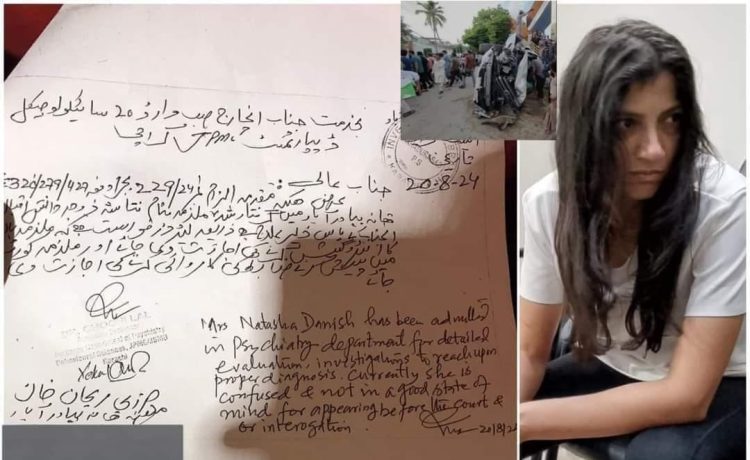In the bustling city of Karachi, where life moves at a relentless pace, a tragic incident on Karsaz Road has stirred a profound debate across the nation.
Natasha Iqbal, a young woman whose life took a tragic turn, was at the center of a horrific car accident that has left many questioning the true cause of the event. Was this a case of a mental illness spiraling out of control, or has it become a convenient excuse in the aftermath of an avoidable tragedy? This article digs into the details of the incident, exploring the fine line between mental health issues and accountability, and what this means for the broader societal implications in Pakistan.
In a matter of moments, the lives of Imran Arif and his young daughter Amina were tragically cut short. As they drove along Karsaz Road, their vehicle was struck in a collision that has since become the center of intense public debate. Imran, a devoted father, and Amina, a child full of promise, were both victims of a
situation that spiraled out of control, leaving behind a void that words can scarcely fill. Their untimely deaths have sparked outrage and sorrow, as the community mourns their loss and demands justice.
Details of accident:
On that ill fated day, Natasha Iqbal was driving her SUV on Karsaz Road when she suddenly lost control of the vehicle. The turbulent SUV careened into multiple motorcycles, causing devastating damage, and eventually crashed into a parked car. The impact of the hits was severe, resulting in a scene of destruction that spread across the busy road. The series of crashes left spectators in shock as they witnessed the horrifying sequence of events unfold.
Eyewitnesses at the scene described the incident as chaotic and horrifying. According to several accounts, Natasha appeared disoriented and agitated right away after the accident. Her behavior raised concerns and confusion among those present, with some noting that she appeared disconnected from the gravity of the situation. Passersby and other drivers rushed to aid the victims, but the sudden and violent nature of the incident left many in a state of panic. Natasha’s demeanor post-accident has since become a focal point in the discussion about the incident, fueling the debate over whether her actions were influenced by her mental state or if something else was at play.
Legal proceeding:
The legal proceedings against Natasha Iqbal, following the tragic incident on Karsaz Road, have been closely supervised by the public and the media.
Natasha faced serious charges, including negligence and culpable homicide under Section 322 of the Pakistan Penal Code. These charges were brought forward as a direct outcome of the fatal collision that claimed the lives of Imran Arif and his daughter Amina. Section 322, which pertains to culpable homicide not amounting to murder, indicates that the act was carried out without the intention to kill, but with negligent disregard for human life.
During the court proceedings, the prosecution requested a physical remand of Natasha, arguing that further investigation was necessary to reveal more details about the incident. However, the court declined this request and instead ordered that Natasha be placed on judicial remand. This decision indicated the court’s
preference for keeping Natasha in custody under judicial supervision rather than allowing law enforcement to have her in physical custody for inquisition.
Central to Natasha’s defense was the claim that she was mentally unstable at the time of the incident. Her legal team argued that her mental health condition impaired her ability to comprehend the consequences of her actions, thus challenging the charges of negligence and culpable homicide. The court acknowledged this defense but remained cautious, opting to examine the evidence and expert testimonies regarding her mental state before making a final determination. The court’s response highlighted the delicate balance between understanding mental illness and upholding legal accountability in cases involving serious harm or loss of life.

Mental health controversy:
The incident involving Natasha Iqbal has ignited widespread debate, particularly concerning the claims made about her mental health. Natasha’s family and
defense team have insisted that she has been struggling with severe mental health issues, citing this as the underlying cause of the tragic events on Karsaz Road. They argue that her actions were not premeditated but rather the result of an acute psychological breakdown. This defense has drawn both sympathy and skepticism, as some members of the public, along with certain media outlets, question the legitimacy of these claims. Social Diary Magazine has highlighted this skepticism, noting that in high-profile cases, mental illness is sometimes perceived as a convenient defense to mitigate responsibility.
Adding to the controversy is the official statement from Dr. Chunni Lal at Jinnah Hospital. After further evaluation, Dr. Lal declared Natasha mentally stable, contradicting the narrative put forth by her family and legal representatives. This declaration has escalated the debate, with many questioning whether the initial claims were an attempt to shield Natasha from the full legal consequences of her actions. The conflicting reports have left the public and legal authorities grappling with the challenges of mental health and its role in the justice system.

Natasha iqbal’s background and positions:
Natasha Iqbal is married to Danish Iqbal, a prominent businessman who is the chairman of Metro Power Group. This conglomerate has diversified interests in
various sectors, including power generation, biofilms, glass manufacturing, and property ventures. Natasha herself holds several key positions within this group of companies.
Key positions held by natasha iqbal
- Chief executive officer
- Metro capital pvt limited
- JSDN electric LTD
2. Board of directors
- Metro power company limited
- Associated companies including swift storage & services (private) limited and gul ahmed’s bio films limited
Natasha’s defense team has claimed that she has been suffering from mental health issues for the past five years, and at the time of the accident, she was not in a stable mental state. This claim is central to her defense, suggesting that her actions were influenced by her psychiatric condition. However, this defense has sparked skepticism and debate, especially given her high-profile professional roles, which raise questions about how someone with severe mental health issues could manage such responsibilities.
Public and media reaction:
The tragic incident on Karsaz Road, involving Natasha Iqbal, has sparked a wave of public outrage and intense media scrutiny across Pakistan. The fact that Natasha, who is reportedly suffering from a mental illness, was behind the wheel during the destructive accident has raised significant concerns. Many in the public sphere are questioning whether her social status and connections will unduly influence the outcome of the case, potentially allowing her to evade accountability.
The media has played a pivotal role in amplifying these concerns, with many outlets highlighting the perceived disparity in how justice is served in cases involving individuals from privileged backgrounds versus those without such connections. The narrative in the public domain has increasingly focused on whether justice will truly be served or if it will be compromised due to Natasha’s influence and family’s standing.
Amid the uproar, a growing sentiment among the public is one of skepticism and doubt. There is widespread concern that Natasha’s social status could lead to a cover-up or a merciful sentence, which would be seen as a grave inequity to the victims, Imran Arif and his daughter Amina. The fear is that this case could follow a familiar pattern where the rich and powerful escape full accountability due to their influence. This has led to a broader debate about the fairness of the legal system in Pakistan and whether it treats all citizens equally, despite their social or economic standing.
Conclusion:
In the wake of the Karsaz Road tragedy, the public and media reactions have underscored the deep-seated concerns surrounding mental illness and its role in legal defenses. While the victims’ families continue their relentless pursuit of justice, the broader public remains divided, with some questioning the legitimacy of the mental illness defense in this case. This incident raises crucial questions about the outcomes of high-profile cases like this one and their lasting impact on public confidence in the justice system. Will justice be served, or will this case become another example of the complexities and challenges faced in balancing compassion and accountability in our legal framework? The answers may well shape the public’s trust in the system for years to come.







